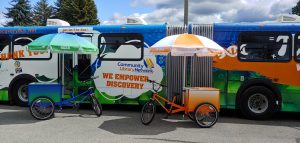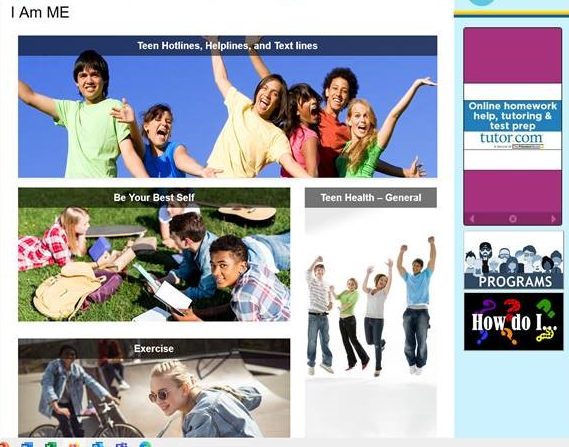Feb
05

Posted by Michele Spatz on February 5th, 2021
Posted in: All of Us, Digital Health Literacy, Health Literacy, News From NNLM PNR, Public Libraries
Tags: All of Us, consumer health, Funding, health literacy, nnlm pnr, public library, Teens, Youth Services
By Guest Contributor Karen Yother, Community Library Network, Idaho
Anyone who has worked with teens will tell you that they are quite the unique audience. What is trendy one day is out of favor the next. They eagerly develop their own personalities and interests, continually seeking ways to express their ideas in a variety of formats. But today’s teens also are under an intense amount of pressure at home, at school, from friends, the community and – unlike their earlier counterparts — in the virtual world.
Project Rationale/Description/Goals
More than 19,600 teens live in our Northern Idaho Community Library Network service area: approximately 34% of our total population. Yet, similar to most communities, needed programs and services to teens are poorly funded. The Alliance for Excellent Education reports that teens (ages 12-18) receive the least financial support, lagging far behind what is invested in children (birth-11 years) and new adults (ages 19 and up).
Conversations with our community partners working with teens center around Adverse Childhood Experiences (ACEs), and ways to help teens overcome traumatic experiences. The more ACEs a child experiences, the more likely he or she will suffer poor academic achievement, substance abuse, and toxic stress. According to the Child Mind Institute, nearly one in three teens meet the criteria for an anxiety disorder by the age of 18. Given that mental health is a topic not frequently discussed, teens often suffer in silence. That needn’t happen as there are a variety of approaches to help teens who have experienced ACEs, including meditation, exercise, and spending time outdoors. To help allay the anxiety suffered by many teens, we developed Pop-Up Library: Wellness Edition, with a focus on mindfulness, physical activity, and nutrition.
Our Pop-Up Library: Wellness Edition project was funded by the Network of the National Library of Medicine, Pacific Northwest Region. Our project goal was to provide health literacy programming along with technology access, exploration, and training to teens in the Community Library Network service area. We planned to use a mobile discovery bike and van to reach young members whose communities lack the facilities and infrastructure to offer wellness programming by using tech-discovery options.
Through this wellness initiative, teens would gain first-hand experience with various mindfulness techniques, access technology to find quality health resources, and discover how their local library is available to assist their wellness exploration, practices and learning.
Regrettably, onset of the COVID pandemic required us to forego the majority of our programming for the time being. Following is a report of what we planned to accomplish … and what we still hope to achieve, once conditions allow.
Project Plans
Our project focuses on teens ages 11-18 and their health literacy needs, specifically providing them access to quality health information and community resources to help reduce stress and anxiety. We identified teens’ health and wellness because teens increasingly use our library for respite and safe harbor. Our project embraces one of the core tenets of precision medicine, a focus of the NNLM All of Us Community Engagement Network and aimed to equip teens with access to quality health information and resources, as well as to empower them to make the best choices for themselves. According to the Precision Medicine Initiative, precision medicine is “an emerging approach for disease treatment and prevention that takes into account individual variability in genes, environment, and lifestyle for each person.” While we are not medical professionals, we recognize the individuality of teens in our community and the need to offer a variety of programs and resources to meet their unique and varying needs.
The Wellness Open House is one program we designed to offer through Pop-Up Library: Wellness Edition. Health, wellness, alternative medicine, and other practitioners were invited to participate, share information, and provide demonstrations as appropriate. All of Us materials would be distributed to all attendees in an effort to raise awareness of the All of Us Research Project. While the Wellness Open House was designed with teens in mind, the event was also open to their family members and the general public. COVID-19 put our Open House on hold, but plans are in place to offer this event later this year.
Many families within our District’s 1,100 square miles lack access to technology and quality health resources, especially in our rural areas. Four of our library communities — Athol, Harrison, Pinehurst and Spirit Lake — are towns with fewer than 2,500 people. These small towns lack the resources and infrastructure to expose teens and families to the countless educational, cultural and entertainment opportunities available through today’s technology. This lack of technology access coupled with work and school schedules, shelter and transportation difficulties, add to the stress of daily life for many teens, contributing to increased anxiety. All of these factors are obstacles to success.
 We planned to use Pop-Up Library Book Bikes, equipped with hotspots, tablets, virtual and augmented reality equipment to bring programming to neighborhoods, parks and targeted community locations. Engaging programs such as meditation, yoga, Zumba, healthful cooking, and paint & sip will be scheduled once it is safe again to do so. Teens will receive access to new technologies and learn about health resources for their personal health literacy toolkits.
We planned to use Pop-Up Library Book Bikes, equipped with hotspots, tablets, virtual and augmented reality equipment to bring programming to neighborhoods, parks and targeted community locations. Engaging programs such as meditation, yoga, Zumba, healthful cooking, and paint & sip will be scheduled once it is safe again to do so. Teens will receive access to new technologies and learn about health resources for their personal health literacy toolkits.
During our planning sessions, the Youth Services (YS) team discussed the project’s programs, community partnerships, timelines and branding needs. We wanted to create a brand that empowered teens and opened them up to a world of possibilities. The team selected “I Am” as the theme to empower teens to think of all the positive characteristics to define themselves: bold, strong, empowered, loved, fearless, creative. Once the project’s logo was completed, using Community Library Network funds, we created materials for distribution at community events to engage teens, including stickers, magnets, and stress balls.
 We built a project website, I am ME, which provides quality health resources for teens. Topics include mental health, self-care, relaxation, food, be your best self, along with hotlines, helplines, and text lines.
We built a project website, I am ME, which provides quality health resources for teens. Topics include mental health, self-care, relaxation, food, be your best self, along with hotlines, helplines, and text lines.
We purchased six (6) sandwich boards to use as ‘talk back’ boards. Drawing from the Public Library Association Project Outcomes evaluation tools, we selected three questions for teen response at each program’s conclusion:
Using this method, teens will write their responses on Post-it notes and place them under each question, giving them an opportunity to respond honestly and anonymously.
COVID-19
We held a few initial programs and were just about to fully launch our Pop-Up Library: Wellness Edition project when the pandemic hit and everything shut down. Staff attempted to re-invent programs to meet community health requirements but were unable to do so in a safe, engaging way. Throughout the pandemic, it has been heartbreaking for staff to see teens stressed and distanced from both their friends and routines, knowing there is nothing we can do. Pre-COVID-19, the library was a safe place for teens to come and hang out, chat with friends and staff, and attend quality programs. Being closed has heightened teens need for a safe place and not being able to provide it was a significant blow to the staff as well as the community.
Recently our local schools began offering mental health and suicide prevention programs to the 3rd-5th grade students. Because of its “I Am” initiative through the Pop-Up Library: Wellness Edition project, the library is poised to provide support and resources to the schools for these students. Being able to support and embed ourselves in the community again to provide kids and teens with tools for their well-being toolbelt is gratifying.
Our “Why”
The Pop-Up Library: Wellness Edition project’s “I Am” initiative is important because one year ago, three teens in our community committed suicide. We are not naïve to think that this project, once fully launched, will save every teen who struggles with mental health, self-esteem, family issues, food insecurity, bullying, trauma – the list of ACEs goes on and on. Rather, we want the library, through this project, to be part of the solution, the place teens will think of to:
Will our teens always make the ‘right’ decision? No. But having the proper tools gets them one step closer and that is something we can all support.
The Community Library Network’s mission, “We empower discovery” encompasses nearly every aspect of what we do. This project aligns closely with what we aim to accomplish every day – to better the lives of our members through empowerment. While we did not get to complete the entire year of our project’s plans, we consider this project one of our stars. Our early efforts were well-received by teens; community members expressed their appreciation; partners have signed on to support it post-pandemic; and staff frequently share new ideas and plans for upcoming virtual and in-person programs.
Setting COVID-19 aside, issues facing teens today can feel overwhelming and insurmountable. The spotlight the pandemic shone on teen health was a stark reminder of why what we do is so important. While we did not have the opportunity to host every aspect of our projects’ programs or events that we wanted to in 2020, we’ve chosen to persevere and forge ahead into 2021 with renewed vigor and excitement to reach the teens in our community and ensure access to quality health resources and programs in whatever format possible.
Note: If you would like more information about the Pop-Up Library: Wellness Edition project, you may reach Karen Yother at: kareny@communitylibrary.net